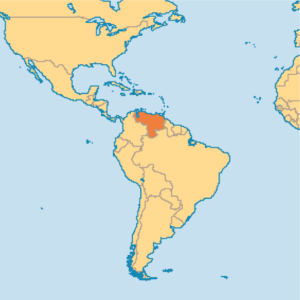TODAY’S READING FROM THE OLD TESTAMENT- MICAH 5:1-7:20
Micah accurately predicts the judgments coming upon the northern and southern kingdoms. Israel is captured by the Assyrians in 722 B.C. and Judah will be taken by the Babylonians more than one hundred years later (606 B.C.-596 B.C.).
Micah 5:1 1 “Now muster yourselves in troops, daughter of troops; They have laid siege against us; With a rod they will smite the judge of Israel on the cheek.
Verse 1 most likely refers to the humiliation that Jerusalem and Judah experience when under siege from the Babylonians in 605 B.C.- 597 B.C. This was accurately predicted by Micah. He presents the bad news of their being taken into exile, with the good news that one day ‘a remnant will return’.
Micah 4:10b 10 For now you will go out of the city, dwell in the field, and go to Babylon. There you will be rescued; There the LORD will redeem you from the hand of your enemies.
The Biblical record agrees with the Babylonian chronicle which states “The seventh year: In the month Kislev the king of Akkad mustered his army and marched to Hattu. He encamped against the city of Judah and on the second day of the month Adar he captured the city (and) seized (its) king. A king of his own choice he appointed in the city (and) taking the vast tribute he brought it into Babylon.”
Nebuchadnezzar attacks Jerusalem again in 589- 586 B.C. Zedekiah the king of Judah, attempts to escape, but they are captured on the plains of Jericho and taken to Riblah. After seeing his sons put to death, Zedekiah has his eyes put out by the Babylonians and is taken captive to Babylon, remaining there until he dies.
“With a rod they will smite the judge of Israel”.
But Micah, brings the good news in with the bad news.
He gives a surprise prophesy concerning the birth of the Messiah. This promise gives hope for the future.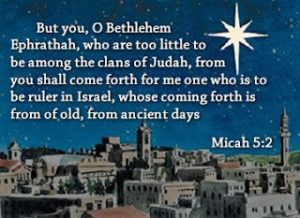
Micah 5:2 2 “But as for you, Bethlehem Ephrathah, too little to be among the clans of Judah, from you One will go forth for Me to be ruler in Israel. His goings forth are from long ago, From the days of eternity.”
In Chapter 5, verse 2, he prophesies of eternity entering time. The Servant that Isaiah spoke about (The Servant Son in Isaiah 42, the Servant Soldier in Isaiah 49, the Servant Student in Isaiah 50, the Servant who Suffers as a Substitute in Isaiah 53) will go forth from God to be ruler in Israel. And where will He be born? In the town of King David’s birth, the place where the sheep for temple sacrifices were raised, Bethlehem Ephrathah. ‘Bethlehem’ means ‘house of Bread’. ‘The Bread of life’ would be born here in the ‘house of bread’. ‘Ephrathah’ means ‘fruitfulness’. Israel proved to be a false vine that failed to bring forth God-pleasing fruit. The true vine would be planted here to bring forth much fruit to the glory of God the Father.
God gave the world His promised King in Jesus of Nazareth. But the world rejected Him. He came to His own, but His own received Him not. But as many as received Him, to them He gave the legal right to become children of God (See John 1:11-12).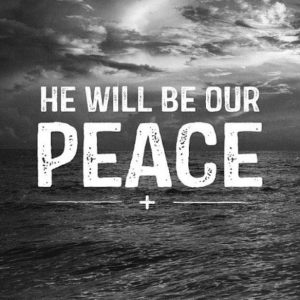
But God is not finished with the world. Jesus reigns at the right hand of God the Father and will return as this world’s Judge at the end of the age. He will reign in righteousness.
“At that time, He will be great to the ends of the earth. This One will be our peace” (Micah 5:4b-5a)
The prophecy that “He will deliver from the Assyrian” refers to a future time when the Lord delivers Israel from her enemies (Micah 5:6). The northern kingdom certainly was not delivered from the Assyrian invasion, but there will be a great deliverance when this happens in the future.
The ‘ruler’ who is born in Bethlehem will be the One who defeats the enemy nations that attack Israel in the Battle of Armageddon. Jesus is the ‘He’ of verse 6.
Micah 5:6 6 They will shepherd the land of Assyria with the sword, the land of Nimrod at its entrances; And He will deliver us from the Assyrian when he attacks our land and when he tramples our territory.
Like Isaiah (Isaiah 1:2f), Micah prophecies that the Lord is calling His people to account. He voices His accusations against Israel and calls upon creation to witness His charges (Isaiah 6:1-2):
Micah 6:3-4 3 “My people, what have I done to you, and how have I wearied you? Answer Me. 4 “Indeed, I brought you up from the land of Egypt and ransomed you from the house of slavery, and I sent before you Moses, Aaron and Miriam.
The Lord is looking for deep repentance that will bring forth the fruit of righteousness. What does that look like? We see it in Christ.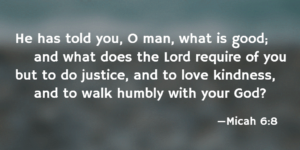
Micah 6:8 8 He has told you, O man, what is good; and what does the LORD require of you but to do justice, to love kindness, and to walk humbly with your God?
A test of whether we are in a right relationship with God, will be our relationship with our fellow man and our changed life that exhibits an ongoing humble walk with God.
Those who know the meaning of the cross, will recognize the justice and mercy of God. They will also seek to promote the expression of justice and mercy in the world.
God’s people cannot justify themselves. The Lord makes the case that, in the light of His justice, we all deserve punishment for our sins.
Micah 6:16 16 “The statutes of Omri and all the works of the house of Ahab are observed; And in their devices you walk. Therefore, I will give you up for destruction and your inhabitants for derision, and you will bear the reproach of My people.”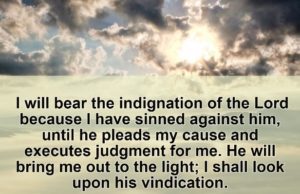
But in Chapter 7 we read of true penitence. A repentant remnant in Israel will recognize that they are receiving their due punishment and will plead for His mercy. Listen to this confession:
Micah 7:9 9 I will bear the indignation of the LORD because I have sinned against Him, until He pleads my case and executes justice for me. He will bring me out to the light, and I will see His righteousness.
Here is true penitence. Repentance is more than remorse. In remorse, a man is merely sorry for himself and the suffering his sin has brought to him personally. In penitence, a man is sorry for what the wrong his sin has done to God. He bears the indignation and suffering, confident that God is using the chastisement to cleanse him and set him free from his sin.
One day Israel will recognize what their sin has done to the Messiah.
Zechariah 12:10 10 “I will pour out on the house of David and on the inhabitants of Jerusalem, the Spirit of grace and of supplication, so that they will look on Me whom they have pierced; and they will mourn for Him, as one mourns for an only son, and they will weep bitterly over Him like the bitter weeping over a firstborn.
TODAY’S READING FROM THE NEW TESTAMENT – REVELATION 7:1-17
At the opening of the 6th seal, the rhetorical question was asked, “Who is able to stand in the day of wrath?”
The answer is found in this interlude prior to the opening of the seventh seal.
In verses 1-8 we are told of the 144,000 from the twelve tribes who are divinely sealed (indicating God’s ownership and protection) in the great tribulation. Some see this as symbolic of all God’s followers. The number is twelve times twelve times one thousand, twelve being a number identified with God’s people. Yet the Scriptures speak of 12,000 out from each of the 12 tribes. Throughout the Book of Revelation, the church leaders are referred to as apostles. It is more likely that these are true Hebrew believers converted to Christ in the tribulation period who are sent as God’s messengers with the gospel. It is possible that these servants fulfill Jesus’ promise of bringing the witness of the gospel to the nations before the end will come (Matthew 24:14).
God still has a plan for Israel. When He makes a promise, He does not cancel it and give it to someone else. It was not until after 160 A.D. that there is any record of an interpretation that identifies the church with Israel. The 144,000 are from the 12 tribes of Israel and are sealed on the earth.
In verses 9-17 we read of an innumerable company in heaven. The Lamb of God died to purchase for God with His blood, people from every tribe and tongue, and people and nation. The people here are described similarly:
Revelation 7:9 9 After these things I looked, and behold, a great multitude which no one could count, from every nation and all tribes and peoples and tongues, standing before the throne and before the Lamb, clothed in white robes, and palm branches were in their hands.
The Apostle John asks the question- Who are these people?
Revelation 7:13-14 13 Then one of the elders answered, saying to me, “These who are clothed in the white robes, who are they, and where have they come from?” 14 I said to him, “My lord, you know.” And he said to me, “These are the ones who come out of the great tribulation, and they have washed their robes and made them white in the blood of the Lamb.”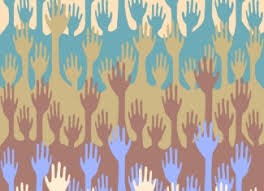
They are standing before the Throne. They are not in purgatory. Nor are they sleeping in their graves. They are perfected in Christ, clothed with robes made white by the blood of the Lamb. They carry palm branches which are symbols of victory.
This picture tells us a lot about heaven. When you see your loved ones in heaven, they are not going to ask how you are, but they will be telling you of the glories of Christ, the Lamb of God, and Him who sits on the throne.
This is a great description of the future for believers: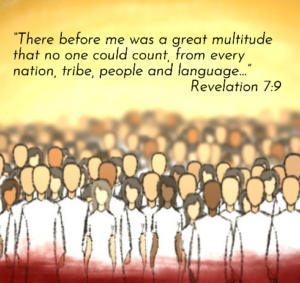
Revelation 7:15-17 15 “For this reason, they are before the throne of God; and they serve Him day and night in His temple; and He who sits on the throne will spread His tabernacle over them. 16 “They will hunger no longer, nor thirst anymore; nor will the sun beat down on them, nor any heat; 17 for the Lamb in the center of the throne will be their shepherd and will guide them to springs of the water of life; and God will wipe every tear from their eyes.”
TODAY’S READING FROM THE BOOK OF PSALMS – PSALMS 135:1-21
The Lord is worthy to be praised! He is good! He has called us to Himself by grace.
He is sovereign over all!
Psalm 135:6 6 Whatever the LORD pleases, He does, in heaven and in earth, in the seas and in all deeps.
The Psalmist then recounts all the great things that God has done in the history of Israel. It also affirms His role as the Final Judge in all things and will expose the idols of this world.
People become like the gods they worship. Mute. Deaf. Blind. And dead.
Psalm 135:15 15 The idols of the nations are but silver and gold, The work of man’s hands.
Psalm 135:18 18 Those who make them will be like them, Yes, everyone who trusts in them.
TODAY’S READING FROM THE BOOK OF PROVERBS – PROVERBS 30:5-6
Proverbs 30:5-6 5 Every word of God is tested; He is a shield to those who take refuge in Him. 6 Do not add to His words Or He will reprove you, and you will be proved a liar.
PRAY FOR THE NATIONS – VENEZUELA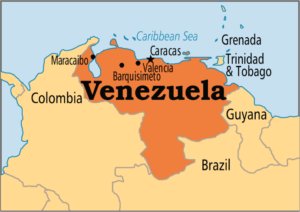
Venezuela
Bolivarian Republic of Venezuela
Latin America
Area: 912,050 sq km
About 80% of the population live along the Caribbean coastal belt in the north; the center and south are grasslands and tropical forest.
Population: 29,043,555 Annual Growth: 1.68%
Capital: Caracas
Urbanites: 94%
HDI Rank: 58 of 182 (UN Human Development Reports 2009)
Peoples: 66 (3% unreached) All peoples
Unreached Peoples Prayer Card
Official language: Spanish Languages: 47 All languages
Religion
Largest Religion: Christian
|
Religion |
|
Pop % |
Ann Gr |
|
24,553,421 |
84.54 |
0.8 |
|
|
3,147,421 |
10.8 |
3.2 |
Challenges for Prayer
The needier sections of society:
- a) The upper and middle classes are under-evangelized but influenced by other religious groups. A number of missions and churches are concentrating efforts to reach these important groups.
- b) Caracas, the capital, is one of the least-reached areas. Over one million live in the ranchos (slums), and gangs or drug barons control entire areas – but there are fewer than 300 churches in the city. Churches and missions are mobilizing to reach the cities in this most urbanized of Latin American countries.
- c) Students, young people and children need more focused outreach. Fewer than 20 Christian student groups (CCCI, MUEVE/IFES) exist for 100 universities, despite over 40 years of campus ministry. Many children live in poverty and have little opportunity to encounter the genuine gospel. More needs to be done to evangelize and disciple this key sector of society.
- d) Prisoners live with severe overcrowding, inhumane conditions, frequent violence, torture of detainees, lengthy pre-trial detention and seemingly untouchable criminals operating within the government, police and armed forces. VOCEP and others share Christ in these dangerous places, and significant numbers are coming to faith. Pray for the safety of believing prisoners, for their spiritual growth and for their integration into society and the Church upon release.
The unreached minorities:
- a) The growing Arab community (more than 130,000) has become prominent in commerce. Most are Lebanese and Syrian. Many are Orthodox and Maronite Catholics, but most are Shi’a and Sunni Muslims. No direct effort to evangelize them has been made, although some ministries (WEC) have a vision for outreach. There are also growing numbers of Iranians and Turks.
- b) The Chinese are mostly Cantonese and are growing in number. There are several congregations of believers for the 50,000-strong community. Several missions have a ministry among them (Mennonites, CMA and WEC).
- c) Western immigrant groups, such as Italians, Portuguese and Spanish, have almost no evangelical believers or outreach focused on them. There is one Messianic Jewish assembly.
PRAYER: Lord, we put our trust in You. For You are good and worthy of praise. As our Sovereign God, You do what is right and pleases You. We worship Your ways, even when we cannot comprehend them sometimes. You chose us in Christ before the foundation of the world and You demonstrated Your justice and mercy, accomplishing such a great salvation, on our behalf. May Your Spirit give us courage to witness to our world the truth about Your justice and mercy, through our words and actions. May we lift high the cross and proclaim Your glory. In Jesus’ Name. Amen.

